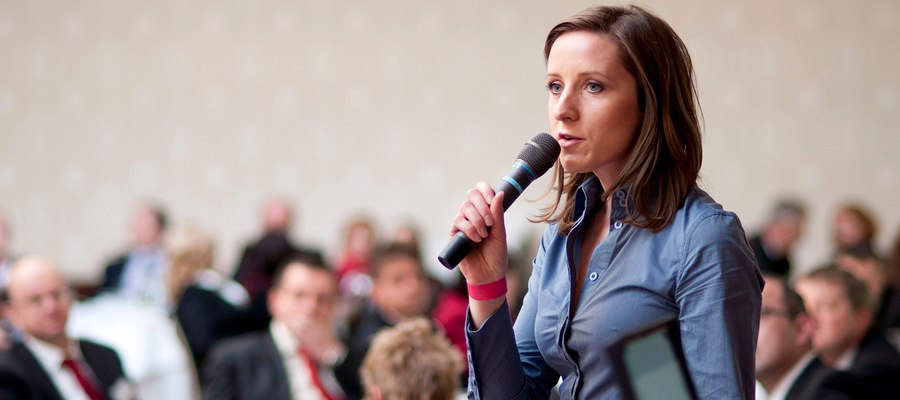
In the opening hours of a conference, audiences are naturally full of energy and enthusiasm – interested in what they are about to learn and engaged with the day. But after a day of listening to talks, it can leave just about everyone tired and drained.
So, if you are speaking last, you might worry that this means that you talk is going to get lost. Thankfully there are plenty of things that you can do to make the most of your presentation. Here we offer practical tips for speaking last.
As a conference is drawing to end you have to accept that you audience has had a long day where they will have had to listen to a large number of talks. Their attention span will be at its natural limit, and the last thing that they are going to want to hear is little more than a sales pitch for your product. They will switch off, zone out, and your session will be wasted.
If you are due to go on last at a conference you are going to need to make sure that you are being as engaging and interesting as possible. And you aren’t going to do this with a lengthy diatribe about the advantages of using your product over another.
Give them a hook instead – provide something interesting to re-awaken their senses. You can then allow your product or service to come up naturally rather than trying to spoon feed it to an audience that really won’t be hungry.
It is essential that your final session stands out in the minds of attendees. Your audience will be going into your talk with the preference that you don’t drag on. They will have already been supplied with lots of ideas and things to think about; they don’t want to be listening to a presentation that is a lot of talking.
This means you need to keep your session fresh and engaging. And one of the best ways to do this is to incorporate new technologies which can then stick in their minds as they leave. A great example for a conference would be something like an audience response system (ARS). These are voting keypads which allow for easy audience participation.
Using modern tools like these means that you’re also more likely to gather honest reactions from your audience. “With more traditional methods for gaining audience feedback, such as asking for a show of hands, research has shown there can be a tendency to follow the crowd”, CLiCKAPAD.
They can be used to survey the audience or even turn your talk into a quiz of sorts. This can be a great way to break up your session and keep them engaged.
It can be a real disadvantage to go on last at a conference, because you will have naturally watched a large number of speakers come and go. You will have therefore seen successes and failures, and this can leave you with a perfectly natural feeling that your talk isn’t what has succeeded in the past during this conference.
If you are comparing your talk to others that have come before you it can then result in your losing confidence in what you are going to talk about. This can be disastrous.
The important thing to note is that you should always focus on your own presentation – there is a good reason you are here, and all you need to do is ensure that your talk is as good as it can be. Different presenter will have their own style or topics, but audiences enjoy variation. Do not, under any circumstances, consider radically altering your talk because of another talk that you have seen that day.
On the same note, it can be easy to watch a great presenter and then think to yourself; mine talk is nowhere near as good, and I need to more like them. You might think that this is your best shot at engaging with the audience. In fact, this is a very bad idea and you must avoid it.
You won’t be doing yourself or your audience any favours by changing the way that you conduct your talks. In fact, if you come across as fake it will have the opposite effect. Play to your own strengths and stick to what you are good at. This is the best way to keep your audience as engaged as possible throughout your talk. And it will give you the best chance of getting your message across.
Author Bio
Dakota Murphey has over 10 years of experience in marketing and events
management. She enjoys sharing her knowledge and experience through her
writing and connecting with other like-minded professionals. Find out what
else Dakota has been up to on Twitter:
@Dakota_Murphey.